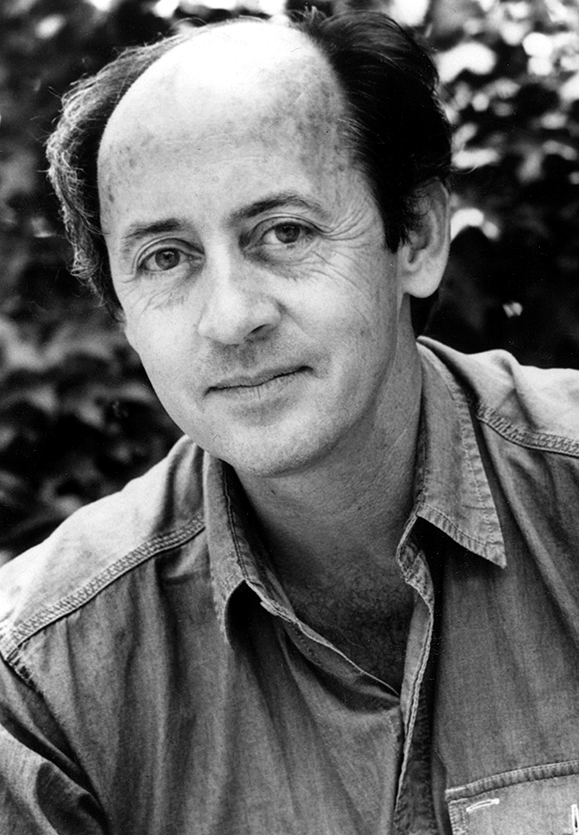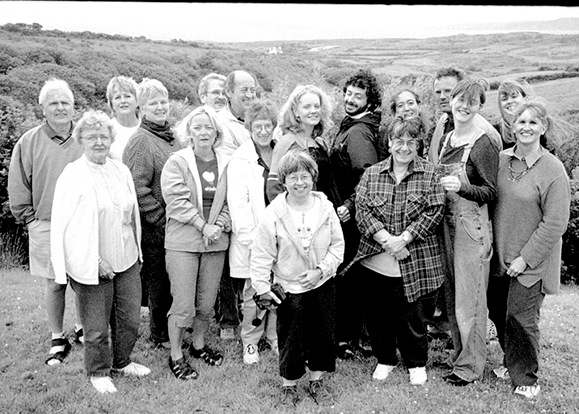A visit to Ireland with Poet Laureate Billy Collins.
What draws an assortment of poets to Ireland to study with Billy Collins?
If you’ve been to the Beara Peninsula, you understand the allure of this mountainous region in West Cork; if you are familiar with Billy Collins’ poetry, its quirky bends and heart-stopping imagery, you would never even ask the question.
Billy Collins was attracting fans long before he was named Poet Laureate of the United States. His readings are always packed and his books have out-sold all other modern poets. He is one of the reasons poetry is so hot in America right now.
Susan Mihalic, Curriculum Director of the Taos Institute of Arts, Taos, New Mexico, predicted he would be Poet Laureate someday. She didn’t realize that honor would be announced on June 21, 2001, a mere two weeks before Collins was slated to teach a workshop for TIA at Anam Cara, a retreat for artists and writers. But she was happy to e-mail the good news to the 12 very lucky poets who had already registered for the trip to Ireland.
So how did the Irish American Collins wind up teaching a workshop in poetry in one of the most remote parts of Ireland?
Surfing the net, Susan happened across Anam Cara’s website, and claims that she instinctively knew this would be a great venue for the Collins’ workshop.
On the other end of the planning was the owner of Anam Cara, Sue Booth-Forbes. Three years ago, Sue moved from Boston to the Beara Peninsula near the village of Eyeries, and purchased the property with the intention of creating an artists’ retreat. She named it Anam Cara, which means “soul friend,” as a tribute to the writer John O’Donohue, whose book of Celtic wisdom bears the same title.
Anam Cara only sleeps five guests, but Sue needed room for 14, so she made arrangements with two local B&Bs, Noreen O’Sullivan’s Shamrock House and Rosarie O’Neill’s Formane’s House to accommodate the overflow. By July 7, Anam Cara was primed for an extraordinary week.

This participant’s journey began on July 5. I traveled by van from Albany, New York to JFK, where I boarded a flight to Dublin, then another flight from Dublin to Cork. As they say in Ireland, there was “a bit of a wait” for the local bus – that’s nine hours in American time. If it hadn’t been for the sleep deprivation, I would have negotiated some other means of transportation, cab or car rental, but the cab fare, quoted between 80 and 100 pounds, was a bit too costly, and the car rental a bit too daunting.
Getting there was part of the story, getting back another saga, but the real story was being there, surrounded by the bays of Bantry, Ballydonegan, Coulagh and Kenmare, in the shadow of the Slieve Miskish mountains. Anam Cara, with its own duck pond, flower and vegetable gardens, and private access to a river with cascades and swimming hole, was picture perfect.
Even though the workshop didn’t begin until Monday, most of us gathered at Anam Cara on Sunday for a get-acquainted session and journeyed on to the local pub. There are not too many who can claim they’ve done the Hokey-Pokey with the Poet Laureate of the United States; the Anam Cara group proudly professes this distinction.
The five-day workshop was conducted mornings in the conservatory, a glass-enclosed sunroom draped with grape vines. The participants, 11 Americans and one Irish native, ranging in age from 18 to 65 and over, represented the entire spectrum from accomplished poet to journal writer.
Monday morning the work began. Collins opened with poetry to enlighten and inspire, and assigned an exercise to be completed by the next morning.
He then explained the ground rules: we were to read an original poem, then as others critiqued the poem, we were to listen without comment. We were allowed to take notes, but were not allowed to advocate for the poem. “See if it stands on its own two legs,” encouraged Collins. “This is a way of moving your poem from the private to the public. Think of this workshop as a finishing school for the poem.”
Each morning the students read the previous day’s assignment, then Collins made a few observations before tackling another round of poems. He offered encouragement as well as helpful criticism, and as participant Stephanie Farrow remarked, “He tells it straight but in a way that you can accept – no mollycoddling.” Peggy Harrington remembered Collins’ “quick wit flying around the workshop table,” and Claire Steiger recalled Collins’ “generosity to the group, laced with a heavy dose of humor.”
Here are a few gems from Collins himself: “As a novelist invents characters, a poet invents his or her voice.” And “The more informed you are by other poets, the more original you will be.”
Regarding the subtlety of poetry: “If you want to write about your father, write about something else which allows the father to slip into the poem when he wants to. Not to sound like Ecclesiastes, but there is a time to be clear and a time to be mysterious.”
And finally, after questioning a student about a particular word, he cautioned about using a thesaurus. His remarks reminded me of a couple of lines from his poem “Thesaurus”:
“It means treasury, but it is just a place where words congregate with their relatives…I rarely open it, because I know there is no such thing as a synonym.”

This rich tapestry woven through Collins’ thoughtful lessons is why we were there. It’s difficult for this student to imagine a more fertile atmosphere from which to begin her own weaving.
On Wednesday evening Anam Cara opened its doors to the public, and Collins treated the local residents to his brand of American poetry. He read 19 poems, and might have read more but he lost the natural light illuminating the room. The residents of Eyeries (and beyond) responded with hardy appreciation to some of my personal favorites, including “On Turning Ten,” “Afternoon with Irish Cows,” and “Nightclub.”
On Thursday evening, a most gracious Collins listened to his pupils read from their works. It was almost the end of the week and his students, who had been allowed only one day “to be stupid” due to jet lag, were relaxed and playful. The evening was packed with poems about old sedans and thin thighs, and for some of the younger students, the evening ended with a dip in the sea to celebrate Chad Reynolds’ 25th birthday.
And then there was Friday night’s farewell party. Eleanor (Ernie) Wormwood, another participant in the workshop, remembered Collins as “a Peter Pan high on Ireland…with all of us poetry kids. He danced with music, with no music, inside, outside…with Irish men and women…with band members.” And in case you think his talent is limited to poetry and dancing, Ernie had a clear recollection of Collins at the microphone singing “a cappella the plaintive `Everything Happens To Me.'”
Did we get what we came for? The youngest poet, Leanne O’Sullivan, received high accolades from Collins. He told her she was “too young to be so good.” Peggy Harrington learned to “look for the emotional center of (her) poems, and to pare down the words to those that support the center.”
Carol Lem brought home at least two prizes: a videotape of Collins with his hands cupped around a freshly-hatched duck; and a finished poem, “Workshopville,” bowing to Collins’ “Schoolsville.”
Chad Reynolds summed up his experience like this: “Billy’s poetry is like an Elvis song: full of technical mastery but with a beat you can shake your hips to. Billy’s teaching style is like a plate of pancakes: lots of good stuff that will stick to your ribs for a long time.”
Ernie Wormwood had a slightly different spin: “It is hard to take a workshop with the poet who wrote the poem `Workshop’ seriously, but Billy is extremely generous. I start to feel goose bumps about writing poems again.”
Sue Booth-Forbes, our hostess, did not attend the workshop, but she too was left with indelible memories. “I found Billy to be just what his poetry is…accessible, irreverent, authentic and clear. From my perspective, he is a fabulous choice for Poet Laureate because of who he is as much as for what he writes.”
And myself? This jewel of a week, colored by emeralds and filled with pearls, will stay with me, it’s true. The seventh stanza from Collins’ “Workshop” sums up the lessons learned from this Professor of English at Lehman College, now Poet Laureate:
“In fact, I start to wonder if what we have here is really two poems, or three, or four or possibly none.” ♦


Leave a Reply